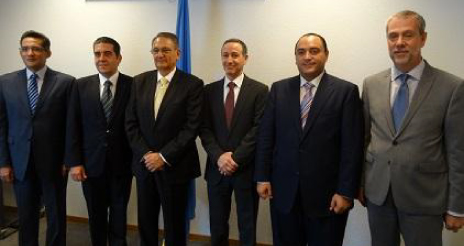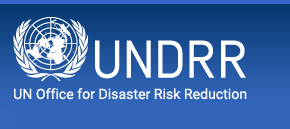- Our Mandate
- Mission and Objectives
- UNDRR in the UN
- Work Programme & Annual Reports
- Results Based System
- Work Partnerships
- Headquarters - Geneva
- SG-UN representatives for DRR
- Regional Office – The Americas and the Caribbean
- Head of the Regional Office – The Americas and the Caribbean
- What is Disaster Risk Reduction?
- What is the International Strategy?
- History of UNDRR
Mexico forges ahead on Sendai implementation
 (Left to right): Mr. Rogelio Conde, General Director of Liaison and Regulations (NCCP), Mr. Jose Maria Tapia, General Director of DRM, (NCCP),Mr. Luis Felipe Puente, National Coordinator of Civil Protection (NCCP), Robert Glasser, head of the UN Office for Disaster Risk Reduction, Roberto Borge, Governor of Quintana Roo, Cancun, Amb. Jorge Lomonaco, Permanent Representative of Mexico to the UN in Geneva.
(Left to right): Mr. Rogelio Conde, General Director of Liaison and Regulations (NCCP), Mr. Jose Maria Tapia, General Director of DRM, (NCCP),Mr. Luis Felipe Puente, National Coordinator of Civil Protection (NCCP), Robert Glasser, head of the UN Office for Disaster Risk Reduction, Roberto Borge, Governor of Quintana Roo, Cancun, Amb. Jorge Lomonaco, Permanent Representative of Mexico to the UN in Geneva.
By Brigitte Leoni
17 March 2016, GENEVA – A high-level delegation from Mexico, one of the world's most disaster prone countries, visited the UN Office for Disaster Risk Reduction today and provided a briefing on its implementation of the Sendai Framework for Disaster Risk Reduction which was adopted on March 18, 2015.
More than 30 per cent of Mexican is affected every year by disasters, from 7,000 seismic shocks to hurricanes, volcanic eruptions, floods, and forest fires. The country is investing heavily in prevention and disaster risk reduction.
The Mexican delegation which will meet tomorrow with the UNDRR Support Group, is led by Mr Luis Felipe Puente, Head of the National Civil Protection of Mexico, who briefed Mr. Robert Glasser, the Special Representative of the UN Secretary-General for Disaster Risk Reduction (UNDRR) on the country's progress in investing in resilient infrastructure and reducing disaster losses.
"Mexico has a solid track record in managing and anticipating disaster risks and has a lot of expertise to share with other countries," said Mr. Luis Felipe Puente. " We have learned the lessons from past disasters and we know that investing in prevention is a government responsibility that we have towards our citizens."
In May 2013, the 30-year-old National Civil Protection was placed under newly elected President Enrique Pena Nieto who has made disaster risk reduction one of his top priorities.
Last October, Hurricane Patricia which was considered the strongest storm ever to hit Mexico caused zero casualties, partly due to the rapid action of President Pena Nieto himself, who mobilized all his government and the country, and issued multiple early warnings which led to timely evacuations.
"Hurricane Patricia is one example of how we can mobilize all local governments, fast and efficiently, to reduce losses in life. The same has happened after the earthquake in 1985, which killed at least 5,000 people. After the earthquake, Mexico has invested huge amounts in resilient infrastructure and enacted new laws to enforce building codes. If an earthquake was happening today, the number of casualties would be a lot less for sure," affirmed Mr. Puente.
"Climate change is now making disaster risk reduction policies even more imperative when unpredictable flash floods and new phenomena, like the intense cold wave we experienced last month which affected 25 out of our 32 Mexican states, are the new normal" said Mr. Puente.
"Mexico has invested more than 50 billion pesos (US$2.8 billion) over the last three years in prevention measures which is one per cent of the Mexican GDP. We are mainly investing in disaster risk actions rather than just putting more money in prevention," confirmed Mr. Puente to avoid creating new risks.
"We want people to realize that we have to change the culture. As an example, we are now investing 15 per cent more in building safer infrastructures such as roads and bridges and this new Mexican model of resilience (Mexico Seguro) will save money in the future.
"The Model also relies on a unique national disaster fund called Fonden which has proved to be very efficient and helpful to communities recovering from disasters. The fund exists since 1999 but the new government has adopted new rules to speed up the allocation of budgets for response and reconstruction giving more responsibilities to local governments.
"Our model is to move fast from reaction to anticipation placing greater emphasis on spreading a culture of prevention working with all the society s linking integrated risk management to all policies" added Mr.Puente.
"We are fully committed to implement the Sendai Framework for Disaster Risk Reduction and we hope to have soon a legal system where prevention is recognized as central and works 24 hours."
Mexico is also investing in new technologies to improve its emergency systems and it has just set up" a 911 number" where all emergency actors are inter-connected.
"We are not yet at the level of Japan and countries which can invest massively in disaster risk reduction but we are working on it and will be able to save more lives in the future "concluded Mr. Puente.
The Mexican delegation includes: Mr. Luis Felipe Puente, National Coordinator of Civil Protection (NCCP), Mr. Roberto Borge Angulo, Governor of Quintana Roo (Cancun), Amb. Miguel Ruiz Cabanas, Vice Minister of Multilateral Affairs and Human Rights, (MoFA), - Mr. Jose Maria Tapia, General Director of DRM, (NCCP), - Mr. Rogelio Conde, General Director of Liaison and Regulations (NCCP) and Mr. Mauricio Rico, Executive Assistant (NCCP).
.
Follow the UNDRR news online:
 Now we have twitter account @UNDRR Américas y el Caribe
Now we have twitter account @UNDRR Américas y el Caribe
JOIN US!
Tweets por el @UNDRR Américas y el Caribe
